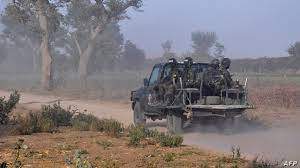Cameroon Says Boko Haram Has Intensified Attacks for Supplies

YAOUNDE, CAMEROON - Cameroon’s military on Tuesday said it deployed troops to its northern border with Nigeria after a series of attacks authorities say were carried out the terrorist group Boko Haram. The group did not claim responsibility, but Cameroonian authorities said they also deployed village militias in response to the attacks.
Cattle rancher Donald Kulbe says economic activity has been halted since Saturday’s Boko Haram attack on Cameroon’s northern village of Dabanga on the border with Nigeria. The 52-year-old director of the Dabanga village cattle market says the fighters killed at least 50 animals and chased hundreds of civilians and cattle buyers from their village. He spoke to VOA from Dabanga via WhatsApp.
Kulbe said the economy has taken a hit in his village due to attacks claimed by the terrorist group, Boko Haram. This, he says, is on top of the economic downturn the Dabanga village is facing because of the coronavirus pandemic. Due to insecurity in the village and fear of customers, cattle ranchers are seeing their income fall drastically.
Several dozen villagers fled for their lives and are still hiding in the bushes in the areas near the border of the village, Kulbe said. Villagers identified at least 20 corpses after the fight between the attackers and Cameroon military.
Midjiyawa Bakary is the governor of Cameroon’s Far North region that shares a border with Nigeria's Borno state, epicenter of the terrorist group according to the U.N. He says more than 100 fighters attacked a Cameroon military base in Dabanga that Saturday.
The heavily armed fighters were on board six pick-up trucks and 20 motorcycles, Bakary said speaking to VOA from Maroua, capital of the Far North Region of Cameroon.
He says the terrorists killed a soldier and wounded two members of the Cameroon military who are undergoing treatment at a local hospital. The Cameroonian military killed 20 fighters and seized six pick-up trucks, 7 motorcycles and weapons the terrorists used in the attack, says Bakary. He says unfortunately, two civilians including a pregnant woman died in the shootout between troops and the terrorists.
Boko Haram has not claimed responsibility over the attack.
On Tuesday, Cameroon said it had intelligence that several hundred heavily armed Boko Haram fighters are hiding on its northern border with Nigeria, planning attacks on Cameroon. The military said troops have been deployed to protect the border zone and recommended that civilians be vigilant and report strange visitors to their villages.
Bakary says Boko Haram fighters are planning to attack communities and military posts in Cameroon for supplies. He says the terrorist group suffered huge losses last year after frequent attacks on Boko Haram strong holds by Cameroon, Nigeria, and Chad militaries.
He says besides wanting to cease weapons from Cameroon, Chadian and Nigerian troops, the terrorists intend to steal food, especially millet and cattle from villagers. Bakary says the fighters are running short of food because their known supply routes are under the military’s control. The military is ready to fight, he added, until the terrorists whose fire power has been reduced, completely surrender.
The last heavy attack by the terrorist group in Dabanga was in 2014. A Boko Haram assault on the base camp of road contractors killed a Cameroon soldier. 10 Chinese workers were abducted. Chinese workers abandoned the road and mining exploration sites following the attack at a camp in Waza. The kidnappers, who are suspected to be aligned with the terrorist group, also stole 10 vehicles and a container of explosives.
The captives were released in October along with 18 other hostages. The Cameroon government denied it paid ransom to secure their release.
Photo: - Members of the Cameroonian Rapid Intervention Force patrol on the outskirt of Mosogo in the far north region of the country.
Link: https://www.voanews.com/africa/cameroon-says-boko-haram-has-intensified-attacks-supplies




